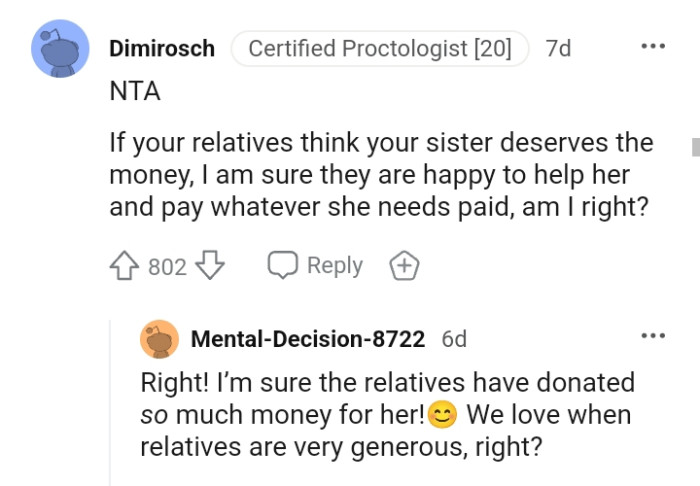Woman Chooses Her Senior Cat Over Her Sister, Potentially Causing Her To Become Homeless
Many times, we've seen or even experienced a scenario when you can tell that one child is being preferred over the other. In addition to how a child's age and personality affect how much support they receive from a parent, there are also problems with parental stress.
Differential parenting or sibling favoritism becomes more obvious when parents are under financial stress, struggle with mental health issues, or have relationship conflicts. Whether you are the chosen kid or not, the perception of unfair treatment has a negative impact on all of your siblings.
The unfavored kid may stand to suffer the most, whether it be from depression, diminished self-esteem, or a persistent need to feel special, even long after he or she has left home.
As anger from favoritism grows, sibling relationships are frequently strained. The OP in today's story has a mom who always treated her less than her sister.
The OP moved out at 18, worked through college, had no contact with her mom, and had low contact with her sister. She has a cat that needs surgery, and the cost is around three months' worth of the minimum wage in the OP's country.
The OP's sister wanders in during this period looking for assistance as her "husband jumped on the NFT bandwagon, and they're kind of broke and a few months behind on their mortgage." The OP told her she couldn't help, and her sister didn't take this well.
The Title

The vet was confident that he still has some life left to live and said that he's by far the healthiest geriatric cat she's seen

The OP told her this is not a good time, and listed the reasons

Sibling Favoritism and its Impact
Research indicates that sibling favoritism can have profound psychological effects on both favored and unfavored siblings. A study by Dr. Jennifer McGuire highlights how perceived favoritism can lead to feelings of inadequacy and resentment, impacting self-esteem and interpersonal relationships.
These dynamics often stem from parental stressors, including financial difficulties and mental health challenges, which can skew parental attention. Understanding these impacts can foster empathy and support within families.
Experts in family therapy highlight the importance of empathy in resolving sibling conflicts. A study from the University of Toronto shows that empathy can bridge gaps caused by favoritism, leading to healthier sibling relationships.
Engaging in activities that promote mutual understanding, such as family therapy or shared experiences, can strengthen familial bonds. Fostering empathy can help siblings appreciate each other's struggles, creating a more supportive family environment.
The Complexity of Family Obligations
Decisions regarding family obligations often reflect deeper psychological themes, including loyalty and past experiences.
Dr. Olivia Martin, a family therapist, highlights how childhood experiences shape our perceptions of familial responsibilities.
Research suggests that individuals may feel torn between their obligations to family members based on early attachment experiences.
Here are some of the most upvoted comments from Redditors for you to read through below

Time to completely cut her out of your life

She has no regard for you whatsoever

A clinical psychologist notes that unresolved childhood issues often resurface in adulthood, affecting decision-making in relationships. This phenomenon is described as 'repetitive relational patterns' in psychological literature. According to Dr. Alexandra Solomon, a relationship therapist, "Many individuals unconsciously recreate familiar dynamics from their past, which can lead to unhealthy relationships." Recognizing these patterns can be the first step toward breaking the cycle and establishing healthier connections with family members, as emphasized by Dr. John Gottman, who states, "Understanding our relational history is crucial for fostering positive change in our current relationships."
This situation also raises questions about boundaries and self-care in familial relationships.
Studies in relational psychology emphasize the importance of setting boundaries to maintain emotional health.
Learning to prioritize one’s own needs while also considering family dynamics can be challenging but crucial for personal well-being.
This Redditor is sure they are happy to help her

She only wants your money and not a relationship

Your sister is way out of line

The Role of Attachment Styles
Attachment theory posits that early relationships with caregivers shape how individuals relate to others later in life. Dr. Mary Main's research at the University of California, Berkeley, demonstrates that insecure attachment can lead to difficulties in trusting others and forming stable relationships.
This may explain why prioritizing a pet over a family member occurs—it's an expression of attachment to a source of unconditional love. Understanding one's attachment style can empower individuals to seek healthier interactions.
Navigating Difficult Family Decisions
Making tough decisions about family can be emotionally taxing and requires careful thought and reflection.
Research from the Journal of Family Psychology suggests that individuals should engage in reflective practices to clarify their values and priorities regarding family obligations.
Such practices can enhance emotional clarity and lead to more informed decisions.
Focus on your cat, your husband and yourself

This Redditor is wishing a speedy recovery for the OP's cat

This Redditor is sending good energy the OP's way for the cat

Behavioral psychologists emphasize the importance of setting boundaries, especially in familial relationships marked by favoritism or unmet expectations. A study from Harvard Medical School indicates that establishing clear personal boundaries can enhance psychological well-being and foster healthier interactions.
Practical strategies include open dialogues about feelings, practicing assertiveness, and gradually reducing enmeshment with family dynamics. These methods can help individuals reclaim their agency and improve their mental health.
To navigate these complex family dynamics, it’s essential to engage in open conversations with family members about expectations and needs.
Practicing empathy during discussions can foster understanding and reduce tensions.
Setting aside time for family discussions can create a supportive environment for everyone to express their feelings and concerns.
Your mom can help if she's bothered

You do not owe her anything

Your family thinks they are entitled to your help

Understanding Parental Stressors
Parental stress can significantly impact a child's emotional landscape. According to Dr. Madeline Levine, a renowned child psychologist, "When parents are under stress, they may unconsciously favor one child, which can lead to feelings of neglect and resentment among siblings." Recognizing these stressors is essential; families can benefit from open communication about financial or emotional challenges. As Dr. Levine emphasizes, "Creating a supportive environment allows all children to thrive, even in difficult times."
Do not pick up baggage that is not yours

Your mom is so eager to give your money away

You don't owe her any explanation

Social psychologists assert that family dynamics are often influenced by broader cultural narratives. A study at the University of Michigan reveals how societal expectations can shape family roles and obligations, leading to conflicts, especially during significant life events.
Encouraging open discussions about these cultural pressures can help family members navigate their feelings of obligation and resentment, allowing for more balanced relationships and healthier interactions.
You should be there for your cat

This Redditor declares the OP not the AH

You are not obligated to give your money to anyone

Healing Through Perspective
Understanding the psychological roots of family conflicts can facilitate healing. Research indicates that reframing one's perspective on family dynamics can lead to greater compassion and understanding.
Practices such as mindfulness and cognitive restructuring, as suggested by trauma specialists, can help individuals process and reframe these complex relationships. This approach fosters personal growth and enhances emotional resilience, making it easier to navigate familial obligations and stressors.
Feeling the need to justify your decision

Your mother can give your sister money

Being the preferred child results in resentment from one's siblings and the added pressure of higher parental expectations. The less-favored children might harbor ill will toward their mother or the preferred sibling.
Clearly, redditors understood the OP's point of view as she was presented with the "not the AH" verdict. Do share this post with your friends and family too.
Psychological Analysis
This scenario illustrates the complexities of familial obligations and the psychological factors that influence these decisions.
Recognizing individual needs while considering family dynamics is crucial for maintaining healthy relationships.
Analysis generated by AI
Analysis & Alternative Approaches
Decisions regarding family obligations require a delicate balance of personal needs and familial responsibilities.
Experts emphasize that fostering open communication and self-awareness can significantly enhance family dynamics.
Psychological Framework & Solutions
Addressing familial dynamics, especially those rooted in favoritism or unresolved childhood issues, requires a multifaceted approach. As Dr. Alexandra Solomon, a relationship therapist, states, "Open communication and empathy are essential for healing and understanding within families." By recognizing the impact of parental stress and attachment styles, families can work toward healthier interactions. With appropriate support, individuals can break the cycle of negative patterns, fostering stronger, more compassionate relationships, as emphasized by Dr. Susan David, an expert in emotional agility, who notes, "Emotional awareness is the first step toward creating meaningful connections."



